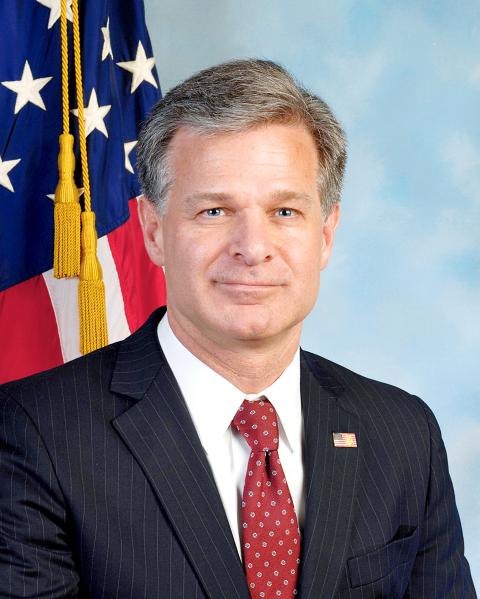US intelligence agencies on Tuesday indicated that they expect Beijing to continue its efforts to force Taiwan to accept its “one China” principle and ultimately Chinese control.
Top US security officials, including FBI Director Christopher Wray, CIA Director Gina Haspel and US Director of National Intelligence Dan Coats, presented their annual assessment of global threats at a meeting of the US Senate Select Committee on Intelligence.
Beijing would almost certainly continue to use pressure and incentives to try to force Taiwan to unify with China, according to the assessment.

Screengrab from the US FBI Web site
Moreover, China continues to monitor Washington’s reaction to gauge its resolve in the region, the report said.
Beijing has since 2016 persuaded six of Taiwan’s 23 diplomatic partners, most recently Burkina Faso and El Salvador, to recognize China instead of Taiwan, the 42-page analysis said.
More broadly, the assessment said that Beijing has been successfully lobbying for Chinese nationals to obtain senior posts in the UN Secretariat and associated organizations, and is using its influence to pressure the UN and UN member states to accept its position on issues such as human rights and Taiwan.
“Beijing already controls the information environment inside China, and it is expanding its ability to shape information and discourse relating to China abroad, especially on issues that Beijing views as core to party legitimacy, such as Taiwan, Tibet and human rights,” the report added.
The assessment predicted that China would continue to increase its maritime presence in the South China Sea, building military and dual-use infrastructure on the Spratly Islands (Nansha Islands, 南沙群島) to improve its ability to control access, project power and undermine US influence in the area.
The report listed concerns about China’s desire to seek control over claimed waters with a whole-of-government strategy, compel Southeast Asian claimants to acquiesce to Beijing’s claims — at least tacitly — and bolster China’s narrative in the region that the US is in decline and Beijing’s pre-eminence is inevitable.
The report issued a harsh warning about the cyberespionage threat posed by China, Russia, Iran and North Korea.
“China, Russia, Iran and North Korea increasingly use cyberoperations to threaten both minds and machines in an expanding number of ways — to steal information, to influence our citizens or to disrupt critical infrastructure,” the intelligence report said.

AGING: As of last month, people aged 65 or older accounted for 20.06 percent of the total population and the number of couples who got married fell by 18,685 from 2024 Taiwan has surpassed South Korea as the country least willing to have children, with an annual crude birthrate of 4.62 per 1,000 people, Ministry of the Interior data showed yesterday. The nation was previously ranked the second-lowest country in terms of total fertility rate, or the average number of children a woman has in her lifetime. However, South Korea’s fertility rate began to recover from 2023, with total fertility rate rising from 0.72 and estimated to reach 0.82 to 0.85 by last year, and the crude birthrate projected at 6.7 per 1,000 people. Japan’s crude birthrate was projected to fall below six,

Conflict with Taiwan could leave China with “massive economic disruption, catastrophic military losses, significant social unrest, and devastating sanctions,” a US think tank said in a report released on Monday. The German Marshall Fund released a report titled If China Attacks Taiwan: The Consequences for China of “Minor Conflict” and “Major War” Scenarios. The report details the “massive” economic, military, social and international costs to China in the event of a minor conflict or major war with Taiwan, estimating that the Chinese People’s Liberation Army (PLA) could sustain losses of more than half of its active-duty ground forces, including 100,000 troops. Understanding Chinese

SELF-DEFENSE: Tokyo has accelerated its spending goal and its defense minister said the nation needs to discuss whether it should develop nuclear-powered submarines China is ramping up objections to what it sees as Japan’s desire to acquire nuclear weapons, despite Tokyo’s longstanding renunciation of such arms, deepening another fissure in the two neighbors’ increasingly tense ties. In what appears to be a concerted effort, China’s foreign and defense ministries issued statements on Thursday condemning alleged remilitarism efforts by Tokyo. The remarks came as two of the country’s top think tanks jointly issued a 29-page report framing actions by “right-wing forces” in Japan as posing a “serious threat” to world peace. While that report did not define “right-wing forces,” the Chinese Ministry of Foreign Affairs was

US President Donald Trump in an interview with the New York Times published on Thursday said that “it’s up to” Chinese President Xi Jinping (習近平) what China does on Taiwan, but that he would be “very unhappy” with a change in the “status quo.” “He [Xi] considers it to be a part of China, and that’s up to him what he’s going to be doing, but I’ve expressed to him that I would be very unhappy if he did that, and I don’t think he’ll do that. I hope he doesn’t do that,” Trump said. Trump made the comments in the context